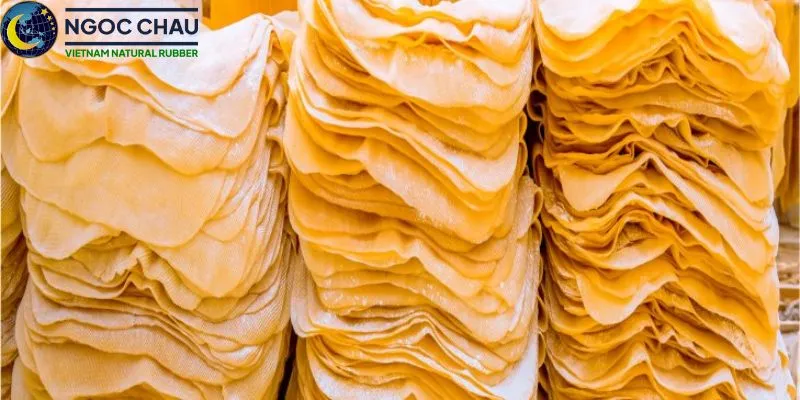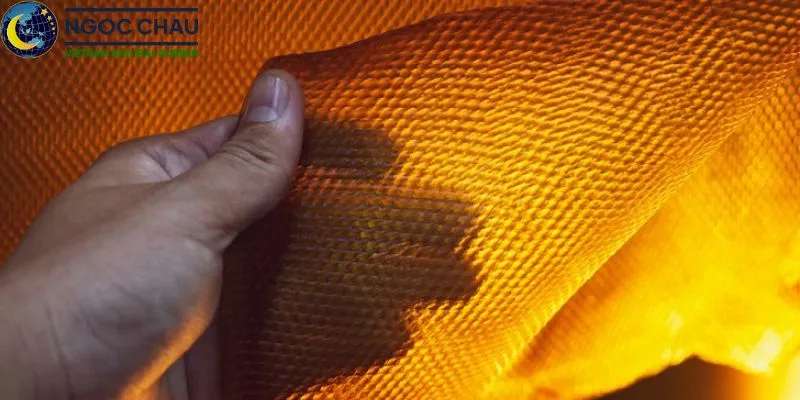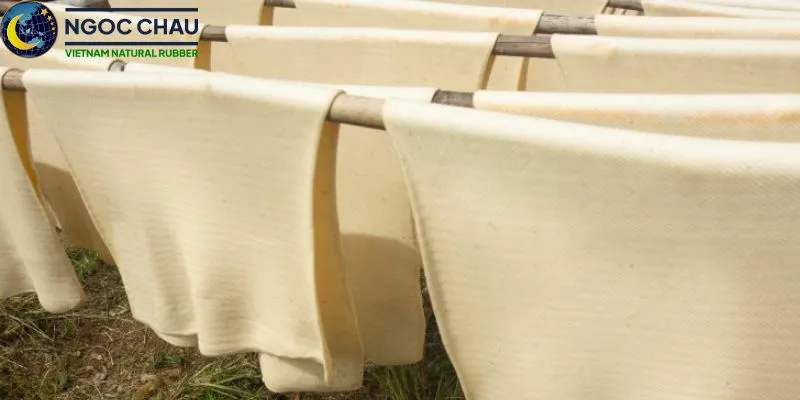Contents
Ribbed Smoked Sheet (RSS) is a high-quality natural rubber trusted worldwide. With outstanding elasticity, durability, and consistency, RSS is widely applied in tyre production, footwear, adhesives, and industrial goods. Backed by ISO-certified standards, sustainable sourcing, and reliable export services, Ngoc Chau Natural Rubber ensures stable supply and competitive pricing for global manufacturers and traders.
What is a ribbed smoked sheet?
Ribbed Smoked Sheet (RSS), also known as Compressed Smoked Rubber Sheet, is one of the most widely recognized forms of natural rubber in global trade. Produced through heat treatment and smoke curing, the process simultaneously dries and coats the rubber surface, enhancing preservation and stability.
After processing, sheets are graded according to international standards, based on contamination, air bubbles, colour uniformity, and resistance to mould. The most common grades used in downstream industries are Grade 2, Grade 3, and Grade 4, meeting diverse demands for tyres, footwear, industrial goods, and adhesives. With its balance of quality, durability, and cost efficiency, RSS continues to be a cornerstone material in the global rubber supply chain.
Common Applications of Ribbed Smoked Sheet (RSS)
Ribbed Smoked Sheet is valued for its wide range of industrial and commercial uses. Below are some of the most common applications of this essential natural rubber product.
Tyre Industry
Ribbed Smoked Sheet is considered the foundation of tyre manufacturing, where durability, elasticity and abrasion resistance are indispensable factors. Its natural elasticity allows tyres to withstand high pressures, ensuring stability, safety and longer service life in a variety of conditions. Both passenger cars and heavy trucks use RSS-reinforced tyres, making it a key raw material for global tire manufacturers looking for stability and performance.
Footwear Manufacturing
In the footwear sector, RSS plays a vital role in producing shoe soles, sandals, and protective boots. The inherent flexibility of natural rubber allows manufacturers to design products that are both comfortable and durable. Its ability to resist wear and maintain elasticity ensures footwear that can endure prolonged daily use while meeting the demands of industries such as construction, mining, and agriculture, where safety and durability are non-negotiable.
Industrial Products
RSS is extensively used in the production of industrial goods, particularly in applications requiring mechanical stability and durability. Products such as conveyor belts, hoses, gaskets, and seals benefit from RSS’s ability to resist pressure, temperature variations, and heavy loads. These qualities make it indispensable in industries ranging from manufacturing and logistics to construction and oil and gas, where efficiency, reliability, and safety standards are critical.
Adhesives & Rubber Compounds
In addition to solid rubber applications, RSS is also processed into rubber-based adhesives and compounds for a variety of industries. RSS’s consistent adhesion and performance make it an ideal choice for automotive assemblies, construction materials, and packaging solutions. Whether used to bond engineered product layers or enhance the durability of coatings, the base compounds provide manufacturers with cost-effective and reliable performance.
General Rubber Goods
The versatility of ribbed smoked rubber sheet is further demonstrated by its application in general rubber products, including carpets, flooring and prefabricated household or industrial items. Its environmentally friendly origins appeal to manufacturers seeking sustainable raw materials, while its physical properties ensure resilience and long-lasting performance. From everyday consumer goods to specialist equipment, RSS continues to support innovation and adaptability across a wide range of markets.
Comparative Overview of RSS, SVR, and Concentrated Latex
Each type of natural rubber has its own characteristics and applications. The table below compares RSS (Ribbed Smoked Sheet), SVR, and Concentrated Latex to help businesses identify the most suitable option.
| Criteria | RSS (Ribbed Smoked Sheet) | SVR (Standard Vietnamese Rubber) | Concentrated Latex |
| Form | Solid sheets with ribbed surface, smoked for preservation | Solid blocks or crumb form, compressed into bales | Liquid form, milky white emulsion |
| Processing Method | Coagulation, rolling, pressing into sheets, and smoke curing to dry and preserve | Coagulation, milling, controlled drying, mechanical processing, and block compression | Centrifugation to increase Dry Rubber Content (DRC), stabilised with ammonia |
| Quality Standards | Graded by appearance: bubbles, dirt content, colour consistency, and surface defects | Controlled by technical indices: Mooney viscosity, dirt content, ash, nitrogen, volatile fatty acids | Evaluated mainly on Dry Rubber Content (60% DRC), Mechanical Stability (MST), and chemical balance |
| Physical Properties | High elasticity, strong recovery, durable performance, but variability depends on grade | Excellent uniformity, consistent mechanical and chemical properties, high stability in industrial use | Superior elasticity and flexibility, soft texture, but may cause allergies due to natural proteins |
| Applications | Tyres, conveyor belts, industrial heavy-duty goods (gaskets, hoses, seals) | Tyres, conveyor belts, precision-demanding products (automotive parts, engineering rubber goods) | Medical gloves, mattresses, foam products, adhesives, cushioning materials |
How to Properly Preserve Ribbed Smoked Sheet
Proper preservation of Rubber Smoked Sheet (RSS) is essential to maintain its elasticity, durability, and compliance with international standards. When stored incorrectly, RSS can quickly lose its physical properties, leading to inefficiencies in production and higher costs for manufacturers.
✅ Temperature Control: Store RSS in a cool, dry environment (15–25°C). Prolonged exposure above 38°C accelerates oxidation, causing hardening and reduced elasticity.
✅ Humidity Regulation: Maintain relative humidity between 50% – 60% to prevent mould growth and surface stickiness. Excess moisture must always be avoided.
✅ Ventilation and Lighting: Keep the warehouse well-ventilated but protected from direct sunlight. UV rays can fade colour consistency and weaken overall quality.
✅ Pallet and Packaging: Arrange RSS bales on clean wooden or plastic pallets, never directly on the floor. Protective covers help block dust, insects, and oil; packaging should be checked regularly.
✅ Inspection and Maintenance: Schedule routine inspections to detect signs of mould, odour, or discolouration. Prompt corrective action safeguards both product quality and international grading compliance.
Conclusion
Ribbed Smoked Sheet (RSS) is a vital natural rubber for global industries, valued for durability, elasticity, and versatile applications in tyres, footwear, adhesives, and industrial goods. With proper preservation, quality and performance are maintained. Ngoc Chau Supplier delivers ISO/TCVN-certified RSS with stable supply and competitive pricing, making us a trusted partner worldwide.
Contact Now
Ngoc Chau Natural Rubber Vietnam
📍 Address: Lexington Building, No. 67 Mai Chi Tho Street, An Phu Ward, Thu Duc City, Ho Chi Minh City, Vietnam
📞 Hotline: +84 76 279 8888
✉️ Email: info@ngocchausupplier.com












 Ms Evan
Ms Evan